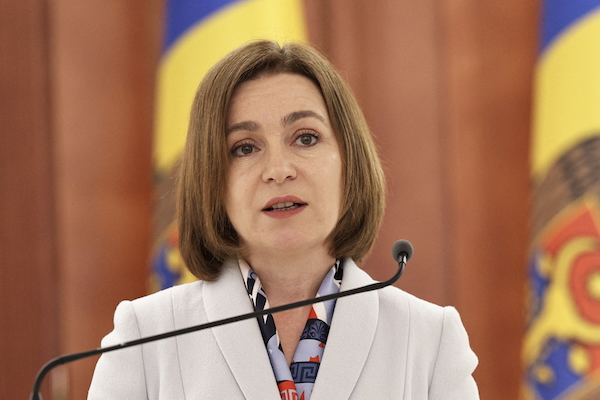 Moldovan President Maia Sandu speaks during a press conference with Romania's President Nicusor Dan following their meeting in Chisinau, Moldova, 10 June 2025;
Credit: Reuters/Vladislav Culiomza
Moldovan President Maia Sandu speaks during a press conference with Romania's President Nicusor Dan following their meeting in Chisinau, Moldova, 10 June 2025;
Credit: Reuters/Vladislav Culiomza
BRUSSELS (Reuters) - On Friday 4 July 2025, it was reported that Deputy Prime Minister Cristina Gherasimov said Moldova wants to start membership negotiations with the European Union (EU) in earnest before a September 2025 election to counter Russian disinformation in the country about the EU.
Both Moldova and neighbouring Ukraine - which is fighting a more than three-year-old Russian invasion - formally began membership talks in June 2024 but they have yet to advance to substantive negotiations on key policies.
Although the EU’s executive body and nearly all member states say Moldova and Ukraine have met the criteria to do so, Hungary has blocked Kyiv’s progress. EU members are reluctant to give Moldova the go-ahead without doing the same for Ukraine.
EU membership is a major strategic goal for both Ukrainian President Volodymyr Zelensky and Moldovan President Maia Sandu as they seek to break away from Russia’s influence and anchor their former Soviet republics in the West.
Ahead of a first-ever EU-Moldova summit in Chisinau on Friday 4 July 2025, European officials face a dilemma in wanting to affirm to Moldova that the EU is committed to its future integration without stoking Ukrainian concerns that it may be left behind.
Accession negotiations are divided into six thematic sections, known as clusters, covering issues such as fundamental rights, economic policy and foreign relations.
"We truly trust the member states that a solution will be found both for Moldova and for Ukraine to open cluster one in the near future," Gherasimov, Moldova's deputy prime minister for European integration, told Reuters in Brussels.
"For Moldova, the timing is crucial. We have elections on 28 September 2025, parliamentary elections where disinformation unfortunately plays a big role and most of this disinformation targets the EU," Gherasimov said.
Pro-Russian politicians, media outlets and social media accounts allege that the EU is not interested in having Moldova as a member.
"We need to show that when we deliver on our side, this is reciprocated by the EU. And this will help us silence those narratives that want to prove the contrary," Gherasimov said.
Hungarian Prime Minister Viktor Orban says letting Ukraine into the EU would drag the whole bloc into war with Russia. EU officials counter that the current debate is just about starting the accession process, which usually takes many years.
While there is no political appetite in the EU for a major round of enlargement in the short term, analysts say the stalemate caused by Hungary's veto raises broader questions.
"There is a lot at stake," said Anastasia Pociumban, a research fellow at the German Council on Foreign Relations.
"I think when the EU is not able to deliver on this promise and on this process, the question is: How relevant is the EU then in this new order?"









